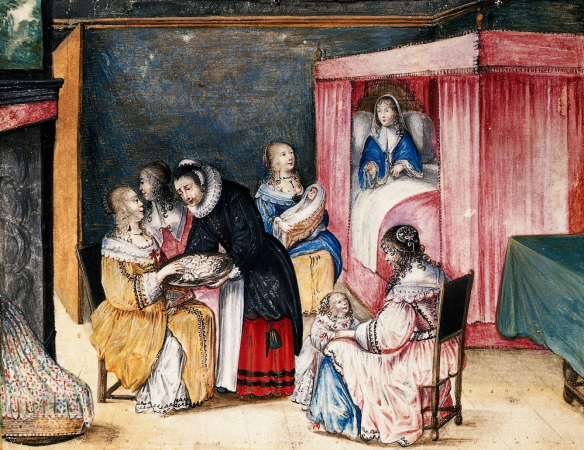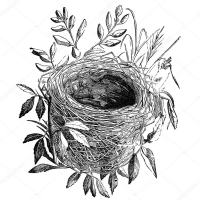Editorial: We were there

By Alex Smith
Welcome to the September issue of the journal. We open with four different birth-related memories.
“I often lay awake at night wondering if my baby, my little girl, would survive the birth. How could I carry on if something went wrong. I was told it is a mother’s lot to worry and that there was nothing to worry about...but that’s not how worry works. When the time came I just had to go through it. I wanted to keep asking if everything was okay but I also needed to be strong for her. In the end, all was well.”
“Night slowly turned to dawn; birds sang outside the window. The everyday sounds of the kettle’s whistle, of the fire being stoked, of the postman at the door, continued, even though time itself stood still. I wondered if I could keep going. The second night crept in and I remember the visceral smells of blood and sweat and effort as the baby finally arrived. It was only the next day that I felt the aches and pains and the total exhaustion of two nights without sleep – but it was worth it.”
“I called the midwife but the lady on the phone said that they wouldn’t attend a home birth before 37 weeks. I pottered in the kitchen making pancakes and doing whatever felt right. The contractions were coming closer and closer. Eventually John decided to call an ambulance. By then I knew the baby was nearly here and I couldn’t concentrate and burned the last pancake. When the ambulance men arrived they joked that we should have called the fire brigade!”
“I was traumatised by the birth; no one listened to me when I called for help. I thought my baby might die. He didn’t; he’s a fine little chap now, but I’m not in a good place. I think I have postnatal depression but I can’t tell anyone. Every day feels like hard work. I don’t want to get out of bed but I have to. When I go out, I don’t really want to come home. I bicker with my partner and I just want things to go back to normal.”
This quarter’s issue is not about the mother’s experience of birth but about the experience of the other people who were with her during the birth and/or the newborn period. They may have been with her in person or perhaps in spirit. In the opening memories above (adapted from real-life accounts), the first is the voice of a grandmother worried for own daughter as she approaches childbirth; the second is the voice of a doula; the third of the mother’s younger brother; and the fourth, of a father. Giving birth is a unique and transformative experience; being with the person giving birth is quite an experience too. The arrival of a baby touches many lives.
Aims’ mission is to improve the maternity services and one way we can do that is to listen to and improve the experience of those who accompany the mother during this time. These people create a protective loving ‘nest’ around the mother and baby, but in order to do this, they also need recognition, respect and support; they need a wider societal nest that holds and values the new family and their support people. When this wider nest is in disrepair those within it become increasingly vulnerable - evidenced by increasing rates of trauma and postnatal depression, and by midwives and doulas flying in droves from a work environment that is broken and unsupportive.

In this issue we hear from these support people. Anne Glover, AIMS volunteer and a doula in Northern Ireland, opens the issue by sharing her experience of what it is really like to witness someone else’s labour and birth, and Anne is followed by Tomoko Holloway a doula from West Wales who echoes my analogy of the ‘nest’ by explaining how she sees the role of the doula as a ‘container’. We then hear from three more doulas. Victoria White offers us a very interesting insight into the needs of birthing people who are not neurotypical. If that word is new to you, her article is a must. Trudi Dawson explains the valuable work of a postnatal Doula, and Nicola Mahdiyyah Goodall gives a harrowing account of how she, and her fellow doulas, had to step up to fill serious gaps in health service provision during and since the pandemic - a situation that caused unprecedented levels of stress and led to many doulas needing to take a break because of illness and exhaustion.
Sometimes the support person was not physically there; perhaps not even aware of the individual event as it was happening. AIMS volunteer Jo Dagustun shares a personal account of the home birth of her youngest child and describes how she drew inspiration and strength from ‘outside the room’. Jo is followed by Hannah Thomas sharing her beautiful and inspirational response to the trauma she experienced when her newborn daughter needed to spend time in the Neonatal Intensive Care Unit. I feel absolutely certain that, through this response, Hannah will be with future parents who find themselves in a similar situation. Next comes Scott Mair, giving us very important insights into the experience of the new father. Scott is followed by Dr Jayne Donegal who explains what happened to her when she supported parents by offering those who wanted this a chance to make fully informed decisions about vaccination, something that was her legal duty to do.
Moving on from the themed section of this issue, Jo Dagustun, as the UK delegate, sends an open letter to all participants of the 2023 annual meeting of ENCA - the European Network of Childbirth Associations - that took place in Budapest this year. Anne Glover tells us about how the maternity services are currently developing in Northern Ireland, and Charlotte Edun gives her report on ‘The International Labour and Birth Research Conference’ that took place in Grange over Sands this April. This is followed by the AIMS Campaigns team’s Birth Activists Briefing that lists a number of recent publications of note. Catharine Hart reviews the Cochrane report: ‘Planned hospital birth compared with planned home birth for pregnant women at low risk of complications’, and Jo Dagustun reviews the book, ‘Union Street’, by Pat Barker, highly recommending one passage in particular. And last but not least, we round up with: ‘What has the AIMS Campaigns Team been up to this quarter?’
We are very grateful to all the volunteers who help in the production of our Journal: our authors, peer reviewers, proofreaders, website uploaders and, of course, our readers and supporters. This edition especially benefited from the help of Anne Glover, Caroline Mayers, Jo Dagustun, Danielle Gilmour, Joanna Rana, Katherine Revell, Salli Ward and Josey Smith.
The theme for the December issue of the AIMS journal is Perinatal Mental and Emotional Well-being. If you have an experience or insight you would like to share - I would love to hear from you. Please email: alex.smith@aims.org.uk
The AIMS Journal spearheads discussions about change and development in the maternity services..
AIMS Journal articles on the website go back to 1960, offering an important historical record of maternity issues over the past 60 years. Please check the date of the article because the situation that it discusses may have changed since it was published. We are also very aware that the language used in many articles may not be the language that AIMS would use today.
To contact the editors, please email: journal@aims.org.uk
We make the AIMS Journal freely available so that as many people as possible can benefit from the articles. If you found this article interesting please consider supporting us by becoming an AIMS member or making a donation. We are a small charity that accepts no commercial sponsorship, in order to preserve our reputation for providing impartial, evidence-based information.
AIMS supports all maternity service users to navigate the system as it exists, and campaigns for a system which truly meets the needs of all.